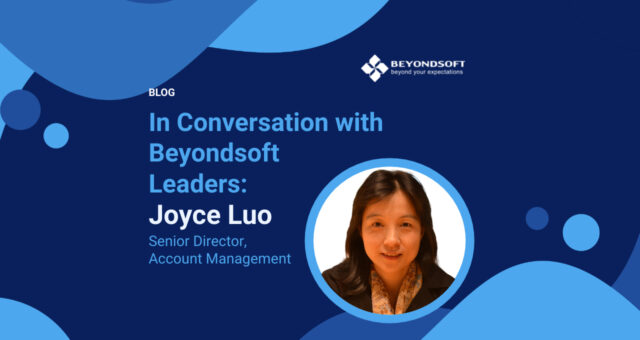Insights

In Conversation with Beyondsoft Leaders: Joyce Luo, Senior Director, Account Management
Leadership is about reading the room, not just reading financial reports. Emotions run high when challenges arise. My job? To stay calm in the storm. I listen deeply, acknowledge concerns, and guide us back to our shared purpose. It’s about creating a space where every voice contributes to the solution. By valuing each perspective, we turn challenges into opportunities for client success and team growth.
Joyce Luo, Senior Director, Account Management
For this Q&A, I met Joyce Luo, our Senior Director, Account Management about her leadership approach and how she builds a safe space for transparent discussion and effective team collaboration.
Sharon: Let’s start with the fundamental question, tell us about your role and your leadership philosophy.
Joyce: I lead account management for Beyondsoft and lead a team of Account Managers. Our role is to ensure our clients’ tech challenges are resolved promptly while driving overall business growth for our company. As an account team lead, I have worked with many clients and their stakeholders for more than 14 years. Every new project is a unique lifecycle as clients’ expectations vary from procurement to project owners, influencers to power users. The consulting business is a high-touch business relationship where our clients rely on us to solve critical business issues. We play two roles in this relationship: we’re a vendor delivering project success on their terms and we’re also a trusted advisor helping them map out each stage of the operations workflow to precisely pinpoint how each stage can be solved digitally and find new opportunities to achieve operations success.
My leadership philosophy focuses on four key areas:
- Collaboration: While I value individual success, I focus on developing strong collaboration to achieve team success. I define team success when our account management and delivery team members have met or exceeded client expectations. To create a collaborative environment, I hone in on what has worked in the past and build on what we can do better.
- Empowerment: I level-set expectations and emphasize the importance of empowering my team to achieve their goals. I don’t believe in micromanagement, just as I don’t appreciate being micromanaged myself. I encourage my team to take the initiative and make decisions independently. This means that when they make mistakes, my first instinct is not to lay blame but to help them consider their learnings and decide on the best path to fix the issue. Being a leader means I don’t expect perfection, but we must learn not to repeat the same mistake again. Instilling the right habits and behavior is important as we build a high-performing account management team.
- Continuous Learning: To me, the best way to grow as a leader is to learn from others and adopt best practices. Every individual brings a unique skill set, experience, and knowledge. From my interaction with my internal teams, clients, and their stakeholders, I learn how individuals respond to conflicts. Situational leadership arises when a leader knows when and how to take specific action to resolve conflicts and de-escalate the situation – is especially important where client success is key.
- Emotional Intelligence: A leader needs to understand his/her team members’ strengths, weaknesses, and interests. In my communication style, I make sure to encourage open and honest communication to ensure that my team feels supported, encouraged, and motivated to grow. Strong team morale is very important to me.
Sharon: Your practical wisdom is refreshing as you are consistently pushing the boundaries and redefining leadership success. What is the biggest challenge you’ve faced and how did you overcome it?
Joyce: My biggest challenge is to manage work request changes that arise as our clients’ business priorities shift. Understanding the motivation and goals behind the change helps me process and articulate the business request to my leadership team. Navigating business priority changes is not easy as they impact our clients’ project delivery timelines and cost structure. We have to reconsider how to deliver excellent value to our clients while adjusting vendor expenditure and managing increased project scope. While we have close working relationships with our clients, we need to work together to align on the new path forward while achieving their business goals.
Sharon: Thank you for sharing the insights. What’s your strategy for developing future leaders within your team?
Joyce: To be honest, I don’t have a formal approach for developing future leaders as I believe the best way to learn is by leading the way and having hands-on experience. Rolling up your sleeves and getting into account management is a practical approach to understanding clients’ challenges and expectations.
Developing future leaders is not an easy task and needs to be deliberate. It’s easy to focus on day-to-day operations which leaves little time to learn how to nurture the next generation of leaders. As I think more about this question, I know we can start by integrating short, practical leadership training sessions into our regular team meetings. We can also pair experienced team members with newer ones for informal mentoring. Additionally, we can encourage team members to take on small leadership roles in their current projects, giving them hands-on experience and feedback. This way, we can gradually build their skills without overwhelming our current workload.
Sharon: That’s impressive. You’re already thinking about how to develop future leaders during our discussion. Let’s switch gears — how do you manage your own development?
Joyce: My personal development journey is a bit different. I continue to learn from my team members, but I also build strong relationships with our competitors outside of work. I’ve established great friendships with many competitors over the years. We don’t talk shop when we meet. We hang out and talk about our families and children. We share experiences of managing work and families and support each other throughout the years. These experiences help me grow personally and professionally.
Sharon: I’m glad to have the chance to chat with you about your leadership philosophy. I have never thought of building a support network with competitors. I have to rethink my support network strategy now. What do you think is the single most important skill a leader should have?
Joyce: Haha…strong emotional intelligence. The consulting business is a high-touch people business. We bring the best expertise (technology and human knowledge) to solve clients’ problems. The ability to handle difficult conversations and resolve conflicts requires empathy and a sharp focus on finding common ground. A leader needs to manage their emotions, authentically connect with his/her team, and be supportive during stressful situations. A leader must provide his/her team space to vent their frustrations, practice the pause, and regroup to focus on finding a solution to the problem at hand.
Summary
Creating a high-trust environment where individuals are not afraid of bringing bold ideas to the table is essential. When team members feel safe and supported, they are more likely to share their thoughts and take calculated risks. We can achieve this by actively listening to everyone’s ideas, providing constructive feedback, and recognizing and rewarding creative contributions. An empathetic leader can motivate and lead the team in good and bad times. While individual success is important, team success drives collective achievement and a sense of shared purpose. When everyone works together towards a common goal, the results are usually more impactful and sustainable.
At Beyondsoft, our leaders lead our teams to drive your business success. If you have an IT challenge that impacts your business, let’s connect.

How we do it
Our success factors over the years are a testament to driving your return on investment. Singapore is our global head office and we have 15 regional offices around the world.

Three decades of strong IT consulting and services

Global presence across four continents

Certifications* in CMMI 5, ISO 9001, ISO 45001, and ISO 27001

>30,000 global experts

Microsoft Azure Expert MSP
ISO 9001 and 45001 (certificates issued to Beyondsoft International (Singapore) Pte Ltd). ISO 27001 (certificates issued to Beyondsoft International (Singapore) Pte Ltd, Beyondsoft (Malaysia) Sdn. Bhd., and Beyondsoft Consulting Inc., Bellevue, WA, USA)
